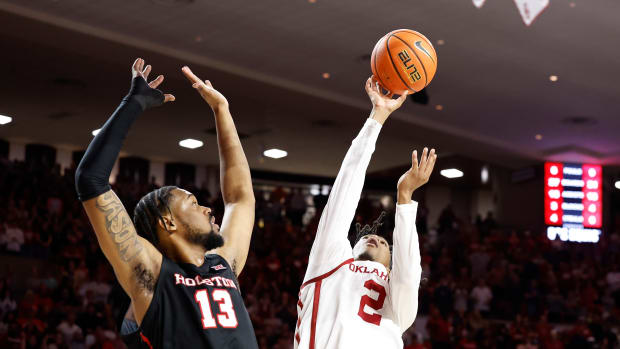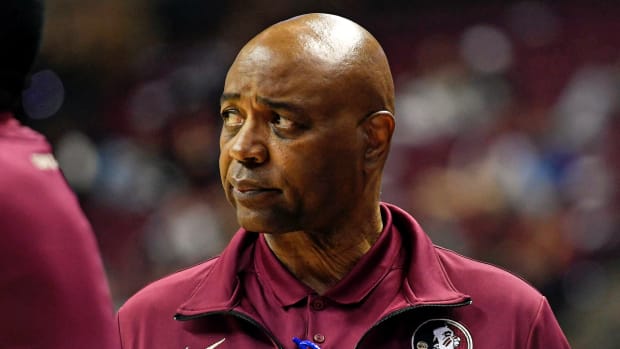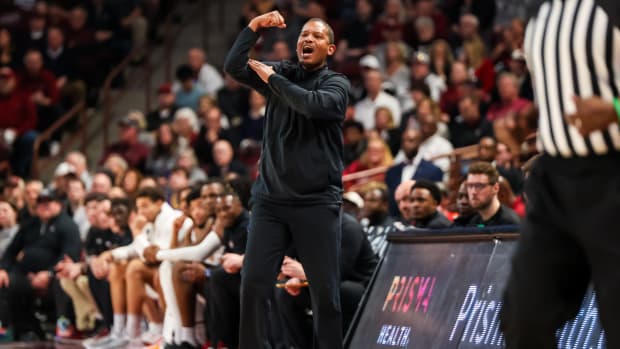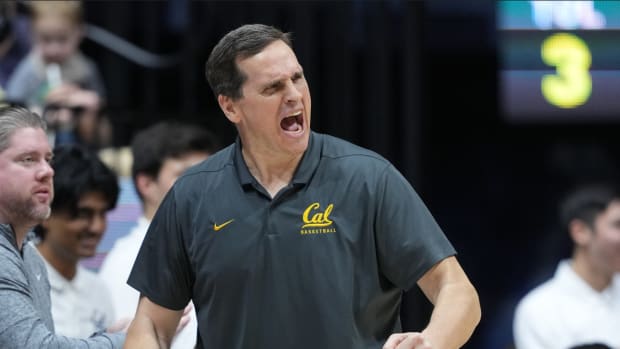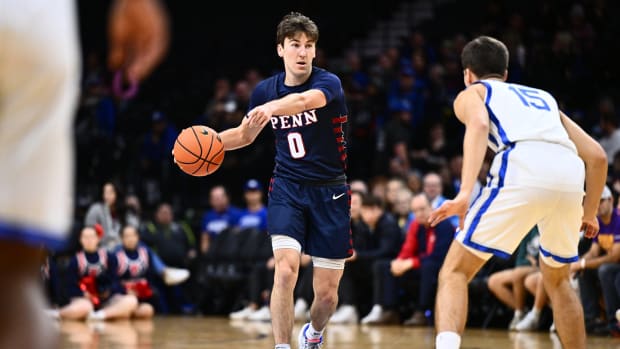After a Turbulent Year, UConn Left Still Chasing a Return to the Top
MINNEAPOLIS — The foundation of the star backcourt that would carry UConn to Sunday’s national championship game was laid not on the ground, but in the air. In June 2017, Paige Bueckers and Azzi Fudd, then ages 15 and 14, suited up for USA Basketball at a tournament in Argentina. Bueckers was her usual expressive self. Fudd, the youngest member of the lineup, was nervous and not overly chatty on the trip.
After winning the event’s gold medal, the two basketball protégés sat next to each other on a flight from Buenos Aires to Minneapolis. In Fudd’s words, it was there and then they were “kinda forced to talk.” With nowhere else to go and nothing else to do, they got to know each other, discussing each other’s families and realizing they were very much alike.
“That plane ride was really crucial to the start of our friendship,” Bueckers says.
Adds Fudd: “That’s when our bonds were really put into place.”
The pair had hoped to come away from Sunday night’s matchup with No. 1 South Carolina with something else to forever bond them—a national title—and a story of joy and celebration, this time about a trip in Minneapolis. But as the Huskies walked off the Target Center floor without a whimper, having been overpowered by the Gamecocks from the game’s first possession to its last, any memories they relay will be of disappointment, not euphoria.
“You just try to use every loss as a lesson,” Bueckers said afterward. “And obviously use it as motivation as a feeling that you don't want to have again.”
That the Huskies were even in the sport’s biggest game seemed like the unlikeliest of outcomes four months ago. In early December, Bueckers suffered an anterior tibial plateau fracture and lateral meniscus tear in her left knee, the most significant injury of her career, that sidelined her nearly 12 weeks. She was part of a cavalcade of players who passed through the team’s training room: Eight of UConn’s 12 players missed at least two games due to injury or illness, and 11 different starting lineups were used throughout the 2021–22 campaign.
There have been multiple times when the Huskies waltzed through the NCAA tournament and brought a national championship back to Storrs, Conn., with little sweat to show for it. But this year’s run was the antithesis of that.
Following a regular season that saw UConn lose five games—the most of any team in coach Geno Auriemma’s 37-year tenure with the program that has played in the national championship—it eked out a round-of-32 win against UCF. Two rounds later, the Huskies outlasted No. 1 seed NC State in a double-overtime instant classic. Versus Spokane Region champion Stanford in the national semifinals, UConn led by only two heading into the fourth quarter and nearly squandered its lead in the waning minutes after eight turnovers in the final frame.
Against the Gamecocks, however, UConn didn’t even have the chance to salvage a victory using late-game heroics. Instead, it never led, having watched as South Carolina more than doubled its rebound total and made 16 more free throws.
Bueckers scored a team-high 14 points and was the team’s lone double-digit scorer. Fudd, who had flourished in the lead-up to Sunday, finished with just three points in 17 minutes. She had missed shootaround earlier in the day after dealing with stomach issues overnight, Auriemma said.
In the past, Auriemma reflected following the loss, UConn had played in title games knowing it was “the better team,” fully aware “we were well balanced and we had all the bases covered and we had everything that you needed to win a championship.” But against a vaunted Gamecocks frontcourt, led by National Player of the Year Aliyah Boston, the Huskies often looked outmatched.
The result marks Auriemma’s first championship game defeat in 12 appearances and the continuation of a title drought that spans back to 2016. As important, it leaves the program left to wonder what it will take to get back to the sport’s top.

Auriemma and the Huskies were 11–0 in national title games entering Sunday’s matchup against South Carolina.
Charlie Neibergall/AP
After UConn returned home from a late-November trip to the Bahamas, the team’s coaches decided to turn a 10-day, game-free stretch into what associate head coach Chris Dailey describes as “a boot camp.” The hardest workouts of the Huskies’ season—and what senior guard Christyn Williams calls the most difficult of her college tenure—came in the aftermath of their Battle 4 Atlantis tournament finale against South Carolina, which beat UConn as convincingly then as it did on Sunday.
The staff sought to improve players’ mental toughness, put more focus on game details like footwork and defensive positioning and ensure those on the floor were being effective and efficient when competing. “[They wanted] to make sure we [had a] resilient mindset so that that situation couldn’t happen again,” says sophomore forward Aaliyah Edwards.
“They were just very demanding and you weren’t getting away with anything,” adds Williams.
Following the grueling sessions, UConn routed its next opponent, Seton Hall. But two days later, on Dec. 5, the trajectory of the Huskies’ season was drastically altered. In the final minute of an eventual 73–54 win against Notre Dame, Bueckers collapsed to the floor while dribbling up the court. She went down untouched and needed to be helped off. “My heart stopped. I felt sick,” Fudd recalls.
Bueckers was “devastated,” “very upset” and “very confused” by the knee injury. Her teammates left the game merely hoping it wouldn’t be a season-ending one.
Fudd could empathize with Bueckers’s situation. At the end of her sophomore season at St. John’s College High School, she tore her right ACL and MCL, doing so one month after being honored as the Gatorade National Girls Basketball Player of the Year. Her mom, Katie, who played basketball at NC State and Georgetown and was later drafted by the WNBA’s Sacramento Monarchs, says Azzi was “very analytical” throughout her rehab. But on the night of Bueckers’s fall, Fudd visited her teammate’s apartment merely to show support.
Says Bueckers: “To have somebody who knows exactly what you’re going through and somebody who can help you mentally and physically is really important.”
Bueckers, last year’s National Player of the Year, had surgery just over a week later and was expected to miss at least two months. Tim Fudd, Azzi’s dad, says Azzi quickly became like a “crutch” for Bueckers, doing all she could to help her teammate and friend. She ensured Bueckers took her medication and helped her get plates of food, with the two often eating together.
Fudd, who herself was sidelined from Dec. 3 to Jan. 23 due to a foot injury, made sure her teammate was icing at the right times and reminded the Hopkins, Minn., native of the small milestones to look forward to throughout the rehab process—like increasing her range of motion or adding weight while trying to strengthen her leg.
They were not the only two who were sidelined, however. Whether it was due to injury or COVID-19, only two UConn players—Edwards and redshirt senior forward Evina Westbrook—appeared in every game this season. Between Dec. 5 and Jan. 9, four were either canceled or rescheduled due to outbreaks within its own program or an opponent. UConn suited up only three times, two of which were losses. And, during the university’s winter break in particular, there were practices in which only five or six players were available.
By the time they took the floor on Jan. 9 against Creighton, the Huskies were 13–4 and their 313-week streak inside the Associated Press top 10 had come to an end. The team’s hot and cold tubs—located right next to each other—had emerged as places to congregate, laugh and remind each other there would be, in the words of senior center Olivia Nelson-Ododa, “a light at the end of the tunnel.”
Sunday night appeared a long way away.
Bueckers made her long-awaited return on Feb. 25 but played only 13 minutes in her first two contests back. In the five tune-up games prior to March Madness, she took more than five shots just once—a far cry from the player who scored 20 points per game last season and averaged 21.1 points in her first six games of this year. Still, the Huskies entered the NCAA tournament riding a 10-game win streak, having not allowed more than 60 points during that span.
As UConn moved through the bracket, Auriemma harkened back to his team’s vulnerability. After his team’s self-described “ugly” win against UCF, he said he was “thrilled to still be playing when you realize how it could have easily gone the other way.” And prior to facing Indiana in the Sweet 16, he said the Hoosiers could potentially win the entire tournament—thereby knocking his own team off.
He called his team’s win over NC State “one of the best games I’ve been a part of since I’ve been at UConn,” knowing full well its season could have ended just 80 miles from Gampel Pavilion. After a 63–58 semifinal victory against Stanford, he said, “I don't think we can win even if we play our ‘A’ game. We need help.”
Against South Carolina, they certainly looked like they needed some.
“I told [Gamecocks coach Dawn Staley] after the game, they were the best team in the country all year,” Auriemma said. “They were No. 1 in the country in November when we saw them down in the Bahamas, and they're the best team in the country today.”
Crystal Dangerfield, a current guard for the Lynx, was on UConn’s roster when Williams and Nelson-Ododa were freshmen. And Dangerfield knows what it’s like not to win a national championship with the Huskies. She highlighted a UConn senior class that had its final season in 2019–20 cut short due to the COVID-19 pandemic. As a result, she left without even getting a chance at one final title run.
Throughout her last year, Dangerfield says she didn’t feel a title-or-bust pressure, but more of a “pressure of knowing it was the last time I’d get to do this.” Williams had taken a similar approach this year, of course wanting to win a championship, but knowing “you can’t think like that or else you’re not going to play well.”
Williams picked a rough night to play one of the worst games of her tenure, scoring just two points against South Carolina—her lone basket coming with less than two minutes to play and the outcome already having been decided.
Westbrook, who transferred to UConn after two seasons at Tennessee, played the best of any of the Huskies’ seniors, scoring seven points and hauling in four rebounds, all while dealing with an ankle injury. She said after, “whether I rolled it, broke it, I was going to try to play regardless.” But in the end it was for naught.
“Just wish things could have gone different for the seniors,” Bueckers said.
Sunday night was supposed to mark a both celebratory repeat of history and joyous homecoming for members of the Huskies. In 1995, Auriemma won his first title with the program in Target Center, having defeated Stanford in the Final Four to advance to the sport’s final game. Earlier in the week, he said “every memory” of that game had been “burned” into his mind. Surely, his first championship game defeat will also leave a scar.
Bueckers grew up around 10 miles from Target Center. And while she called her experience in recent days “amazing,” she also noted “nobody in my position would be happy right now, so I'm obviously upset just with the way things ended.” Fudd’s grandparents on her mom’s side live just outside the Twin Cities. (She proudly says she has never missed a Minnesota State Fair.) While the freshman was not made available to reporters afterward, it’s hard to imagine that she too doesn’t feel disappointed.
The continued development of Bueckers and Fudd should make UConn an immediate contender next season. But how the Huskies will guard teams with dominating bigs like South Carolina remains a relevant question.
Key reserve forward Dorka Juhasz, who missed the Final Four after suffering a season-ending wrist injury against NC State, has already announced her plan to return. And Edwards, a starter in all but 11 games, should again play a big role. The Huskies are also adding the No. 5 recruit in the incoming freshman class, as 6’3’’ post player Isuneh Brady could potentially be an instant contributor.
Still, in the aftermath of Sunday’s loss, Auriemma acknowledged that it’s difficult to predict what might happen next season. “This year was a perfect example of, you plan for some things and then all of a sudden your plans get blown up,” he said.
Despite a night full of frustration, he remained optimistic.
“I like our chances,” Auriemma said. “Provided we don’t have to navigate a season like we did this year, knock on wood, if we stay healthy, I expect to be back here next year.”
But there’s a major difference between getting back to the Final Four, and finishing at the top.
More March Madness Coverage:
• Auriemma: ‘I Expect to Be Back Here Next Year’
• Boston Cries ‘Happy Tears’ After Gamecocks’ Title
• The Lost History of the Only HBCU to Make Final Four


